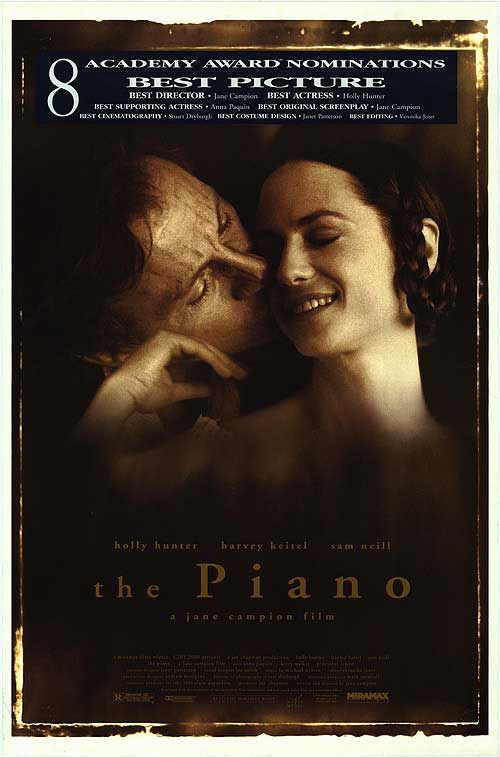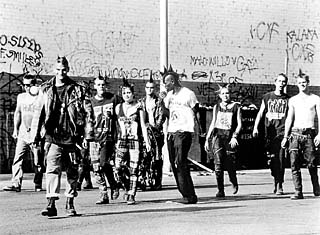Directed by: Gabe Ibáñez
Written by: Gabe Ibáñez, Igor Legaretta Gomez, Javier Sanchez Donate
Starring: Antonio Banderas, Birgitte Hjort Sorensen, Dylan McDermott, Robert Forster, Tim McInnerny, Melanie Griffith
USA, 2014
Following up 2009’s Hierro, Gabe Ibáñez goes from domestic to sci-fi mystery with Automata. Set in 2044 AD, when solar storms turn Earth into a radio desert and reduces the human population, robots have become a staple for survival. A corporation called ROC, in particular, creates a line of robots called the Automata Pilgrim 7000s to assist humans in their quest for living, building the walls needed to protect mankind. Security protocols have been programmed to prevent robots from harming any form of life, and from altering themselves altogether. In this dark and dystopian future, plucked from a chapter of Ridley Scott’s Blade Runner or Danny Cannon’s Judge Dredd, the audience follows ROC insurance investigator Jacq Vaucan (Antonio Banderas). Burnt out and pessimistic, Vaucan is desperate to transfer to the coast to enjoy a quiet life with his pregnant wife (Brigitte Sorensen) and their unborn baby. Stuck in between dreams and reality, Vaucan finds himself under pressure from his boss Robert Bold (Robert Forster) to solve a new case in which a unit has been supposedly self-altered, filled with illegal parts, and found to have no second protocol.
 More or less the same way Harrison Ford’s Deckard hunts down replicants in Blade Runner, Antonio Banderas’ Vaucan is doing the same as he investigates the actions of the Automata. Similarities can’t be avoided when comparing Ibáñez’s take on a dismal future to that of Ridley’s or Cannon’s films, and unfortunately when up against beloved classics, Ibáñez’s take feels too slight and ripped off. From the ghetto like street corners reminiscent of Korben Dallas’ (Bruce Willis) neighborhood in Luc Besson’s The Fifth Element, down to Vaucan’s trench coat stylized after Neo’s (Keanu Reeves) outfit in the Wachowski’s The Matrix, much of Automata’s set design feels stolen rather than originated. Even television transmissions look like holograms taken out of Lucas’ Star Wars. The film feels more like an idea of what a sci-fi action thriller ought to be without nailing it on the head. Sure, there are great ideas in the film, raising prolific questions about life and death, but they are executed extremely poorly. As far as the sci-fi elements are concerned, the film fails.
More or less the same way Harrison Ford’s Deckard hunts down replicants in Blade Runner, Antonio Banderas’ Vaucan is doing the same as he investigates the actions of the Automata. Similarities can’t be avoided when comparing Ibáñez’s take on a dismal future to that of Ridley’s or Cannon’s films, and unfortunately when up against beloved classics, Ibáñez’s take feels too slight and ripped off. From the ghetto like street corners reminiscent of Korben Dallas’ (Bruce Willis) neighborhood in Luc Besson’s The Fifth Element, down to Vaucan’s trench coat stylized after Neo’s (Keanu Reeves) outfit in the Wachowski’s The Matrix, much of Automata’s set design feels stolen rather than originated. Even television transmissions look like holograms taken out of Lucas’ Star Wars. The film feels more like an idea of what a sci-fi action thriller ought to be without nailing it on the head. Sure, there are great ideas in the film, raising prolific questions about life and death, but they are executed extremely poorly. As far as the sci-fi elements are concerned, the film fails.
 The mystery behind Automata plays like a film noir, and if seen primarily as one, is quite refreshing with its futuristic twist. Vaucan’s investigation takes him into a restricted area where he witnesses a Pilgrim unit committing suicide by setting itself on fire. The mystery deepens when he visits an Automota engineer named Dupre (Melanie Griffith) who offers new insights into the automata programming. Banderas gives a solid performance, but can easily be replaced by another actor of his same caliper. When partnered with Griffith, dialogue becomes too operant knowing the couple’s off screen relationship. The film becomes existential, making it seem like a parody on the genre itself at times. Villains are hokey, although Dylan McDermott’s is unrecognizable as Wallace the corrupt law enforcement. What follows is a not-entirely failed attempt at action, suspense, and philosophy as Vaucan comes to understand that the future of mankind might depend on the outcome of the investigation. The most unique storyline and link to the film noir genre is that of the prostitute drone Cleo (also voiced by Melanie Griffith), acting as the femme fatale and leading Vaucan to a questionable location void of human life. Yet the film’s core conspiracy is somewhat confusing with little substance from script.
The mystery behind Automata plays like a film noir, and if seen primarily as one, is quite refreshing with its futuristic twist. Vaucan’s investigation takes him into a restricted area where he witnesses a Pilgrim unit committing suicide by setting itself on fire. The mystery deepens when he visits an Automota engineer named Dupre (Melanie Griffith) who offers new insights into the automata programming. Banderas gives a solid performance, but can easily be replaced by another actor of his same caliper. When partnered with Griffith, dialogue becomes too operant knowing the couple’s off screen relationship. The film becomes existential, making it seem like a parody on the genre itself at times. Villains are hokey, although Dylan McDermott’s is unrecognizable as Wallace the corrupt law enforcement. What follows is a not-entirely failed attempt at action, suspense, and philosophy as Vaucan comes to understand that the future of mankind might depend on the outcome of the investigation. The most unique storyline and link to the film noir genre is that of the prostitute drone Cleo (also voiced by Melanie Griffith), acting as the femme fatale and leading Vaucan to a questionable location void of human life. Yet the film’s core conspiracy is somewhat confusing with little substance from script.
The script by Igor Legarreta, Javier Sanchez Donate and Gabe Ibáñez features some genuinely thought-provoking interactions between man and robot. Unfortunately, elsewhere the dialogue is somewhat cumbersome and removed from the film’s context. Performances are similarly inconsistent, with Banderas replaceable as Vaucan and Robert Forster excellent in support, but some of the smaller roles are filled by non-memorable characters. And while there are some interesting ideas at work here, one can’t help but feel like homage has been ripped off by unoriginal filmmaking. Yet with a modest budget at hand, Ibáñez does a fair job at balancing wits with spectacle, making Automata a worthwhile watch. A sci-fi with brains and muscle, Automata works as an entertaining meditation on man’s struggle with life and relationship with technology.
– Christopher Clemente






